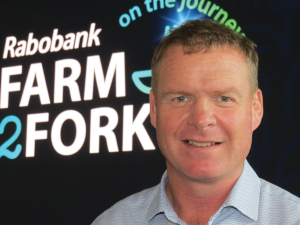Fonterra’s exit from Australia ‘a major event’
Fonterra’s impending exit from the Australian dairy industry is a major event but the story doesn’t change too much for farmers.
 Rabobank New Zealand chief executive Todd Charteris says while sector confidence was still very low, it was pleasing to see it improving and added that strong demand for fruit and vegetables in domestic and international markets have helped to hold up prices.
Rabobank New Zealand chief executive Todd Charteris says while sector confidence was still very low, it was pleasing to see it improving and added that strong demand for fruit and vegetables in domestic and international markets have helped to hold up prices.
Rabobank's latest Rural Confidence survey has found that while farmers' sentiments are still in deeply negative territory, they have crept up from historic lows in late 2022.
Completed in late March, the recent survey found farmer confidence was up on the previous quarter - with net confidence reading rising from -71% to -58%.
It found that the number of farmers expecting conditions in the agricultural economy to improve in the coming 12 months had risen for 4% to 5%. Meanwhile, the percentage or farmers expecting conditions to worsen fell from 75% to 63%.
A total of 31% were anticipating the agricultural economy to remain stable, up from 19% previously.
Rabobank says the higher confidence in the broader agri economy has been partly driven by improved sentiment among sheep and beef farmers and horticulturalists. It put this down to improved demand for New Zealand red meat from the Chinese market following the abandonment of China's Zero-Covid policy late last year and subsequent reopening of their food service sector.
Rabobank New Zealand chief executive Todd Charteris says while sector confidence was still very low, it was pleasing to see it improving. The uptick in confidence came despite incredibly challenging conditions for many primary producers in the early part of 2023 with Cyclone Gabrielle and South Island droughts.
He added that strong demand for fruit and vegetables in domestic and international markets have helped to hold up prices after inclement weather disrupted production in several regions. On the other hand, dairy farmers were now even more pessimistic about the broader agri-economy than they were last quarter.
"Demand out of China has been slower to return for dairy products than it has for other food products and we've also seen increased global supply act as a constraint on prices," he admitted.
"As a result, Fonterra lowered their milk price forecast. The prospect of a lower payout, coupled with ongoing elevated farm input prices, has further eroded the already dwindling confidence of the country's dairy farmers."
Among farmers with an optimistic outlook across all sectors, the survey found overseas markets (54%), demand (34%) and rising commodity prices (31%) were the major sources of optimism, while major concerns continued to be rising input costs (65%) and government policy (53%).
Farmers' confidence in their own business performance was up marginally on last quarter, with the net reading rising from -53% to -45%. 26% of those with a negative outlook nominated 'other' factors as a reason for holding a pessimistic view on the agri-economy.
Charteris says while farm input prices had been a key concern for several quarters, Rabobank was seeing some softening of key input prices in global markets - particularly fertiliser - which was expected to filter through to New Zealand prices in the near term.
"As with confidence in the broader economy, the latest survey found growers and sheep and beef farmers are more upbeat in the prospects for their own businesses, with dairy farmers now more pessimistic," Chateris says.
"You have to go all the way back to 2006 to find a lower result for dairy farmers on this measure. This survey also found labour issues cited frequently in the verbatim responses as well as several new concerns including weather events and economic recession."
Farmer investment intentions were back slightly from last quarter, while farm business viability marginally improved.
Controls on the movement of fruit and vegetables in the Auckland suburb of Mt Roskill have been lifted.
Fonterra farmer shareholders and unit holders are in line for another payment in April.
Farmers are being encouraged to take a closer look at the refrigerants running inside their on-farm systems, as international and domestic pressure continues to build on high global warming potential (GWP) 400-series refrigerants.
As expected, Fonterra has lifted its 2025-26 forecast farmgate milk price mid-point to $9.50/kgMS.
Bovonic says a return on investment study has found its automated mastitis detection technology, QuadSense, is delivering financial, labour, and animal-health benefits on New Zealand dairy farms worth an estimated $29,547 per season.
Pāmu has welcomed ten new apprentices into its 2026 intake, marking the second year of a scheme designed to equip the next generation of farmers with the skills, knowledge, and experience needed for a thriving career in agriculture.

OPINION: Here w go: the election date is set for November 7 and the politicians are out of the gate…
OPINION: ECan data was released a few days ago showing Canterbury farmers have made “giant strides on environmental performance”.